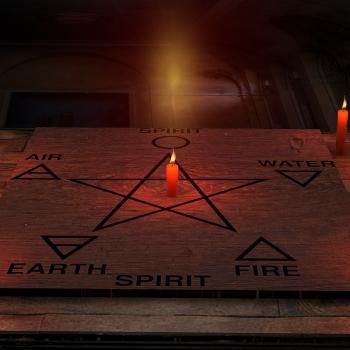“Once you know the truth, discard it.” – Unknown
Everybody lies, but not all lies are created equal. For the purpose of we who study magic, there are three categories of lies that everyday people tell, and a fourth that we tell. These categories aren’t about techniques of lying so much as they are about the nature of power and the deeper nature of the self.
The three common kinds of lies are those we tell for our own benefit, those we tell to promote harmony, and the ones we tell to maintain sovereignty. All of these are all what we might call social lies. They are all, if not always rational, at least reasonable.

These three categories are not exclusive, but are in fact nested. We can say that all lies are told for our own benefit. Some of those we tell to promote harmony, and some of those are told to defend our sovereignty.
The fourth type of lie, different from the rest, is the magical lie. These are lies we tell as acts of magic. If social lies are ones that we tell as we take part in society, magical lies are those that we tell to hold our place in society while stepping outside of its rules and beliefs.
Lies We Tell for Our Own Benefit
By far the most common conception we have of lying is that we do it for our own benefit. While it wouldn’t take much stretching to say that this is true of all lies in one way or another, doing so is more a trick of the light than useful analysis.(1)
The admonition in the Christian Bible to “not bear false witness” is talking about this kind of lie. There are other applications as well. If I tell people at a party that I have a Ph.D. in order to lend weight to my arguments, that is a lie for my own benefit. And when I leave out critical information (say, by taking off my wedding ring before introducing myself to a pretty girl), that’s still lying.
Lies we tell purely for our own benefit have a tendency to cause trouble. If I’m a bank robber and I lie to the police, they might throw an innocent person in jail for my crime. This magnifies my crime by expending someone else’s life.
These are the lies that are the simplest ones. These are lies that every sitcom seems to warn us about. “Did you dent the car, Jim?” “No.” And then hilarity ensues as Jim attempts to cover up his mistake – and in the end we all learn the lesson that it’s better to tell the truth. Right?
Yeah, not so much.

Lies We Tell to Promote Harmony
The second kind of lie is less about putting yourself ahead as it is about maintaining relationships. There are myriad lies that we tell to maintain harmony.
You got the promotion we were both competing for! I’m so happy!
The classic example of harmonious lies is the “white lie.” Living as we do among people, we often have to deal with others who have inflated senses of their own importance, unreasonable expectations of the world, or personality flaws that are terrible, obvious, and not worth getting into. In order to get on with our days, sometimes we have to bite the bullet and tell them what they need to hear.
The key to the harmonious lie is to understand and respect personal barriers and the importance of relationships. Sometimes there are higher values in a situation than “the truth” – trashing valued and carefully maintained relationships over a simple disagreement of “facts” isn’t necessarily wise.
At its simplest, social binary interactions are all about promoting harmony. When the cashier asks us, “how is your day?” they don’t want to know. Chances are, their day’s not so awesome, either. The polite inquiry expects only a polite response, even if it’s a lie.

Lies We Tell to Maintain Sovereignty
In the brutal, competitive world of primates with language, the lie to maintain sovereignty is a necessary defense, especially when dealing with people who have much higher social power. These lies come down to politely telling nosy people that it’s none of their concern or business. Whether it’s dealing with a dominating boss or the neighborhood busybody, there are times when lying is a necessary part of social relationships.(2)
In short, lying smoothly is a basic form of self-defense. Each time we answer a question “honestly”, we are committing to that representation of ourselves. A question as simple as “what do you want for Christmas?” is a request for us to share a little piece of ourselves. But just because someone asks, that doesn’t mean they have a right to know. That’s your call.
Nosy questions are often a way of establishing social authority. This is a key part of dominance play in the cube farm (the modern battlefield for access to resources). If someone asks, “how’s that project going?” there’s a better than average chance that they’re not thinking about helping you. They’re establishing that you, in some small way, answer to them.
Lies We Tell as Acts of Magic
And finally, there are some lies that we tell in the furtherance of our spiritual growth. No, I’m not talking about wishful thinking. While “fake it ‘til you make it” certainly has its place, I am talking about something much more, well, magicky.
There is a broad swathe of social interaction that is more or less social wrestling, and the prize is social power. Each person tries to pin down the other, catch them out, and pretend to value and social worth. This is the social interaction that makes up being aggressively middle class. It is the battleground of social cutting.(3)
This battle for social recognition isn’t some petty game. It’s the way that we, lovely primates that we are, establish dominance and access to resources. It’s how we establish safety and consistency in a world that provides neither.
For most people, the social world is the only one that exists. The average person doesn’t have access to the world of magic. But most everyone, from the trash collector to the multinational corporate CEO, has access to society and some level of power.
For the everyday person, who lives more-or-less entirely in the social sphere, lying is usually a matter of raising, maintaining, or protecting social position. And social position is everything.
But for a magician? For someone who (we might imagine) spends their Tuesday night interacting with fundamental powers of the universe and Wednesday morning maintaining a database at an insurance company? Well, it gets complicated.
There is an old saying that goes something like, “with one ass, a man cannot ride two horses.”(4) It means that we cannot, being one person, follow two paths.
A competent magician, then, is by this definition a person with two asses. Lies, as acts of magic, are the ways we maintain access to both worlds. Everyday lies are the lies we tell to promote, maintain, and defend the social self. But once we’ve touched a deeper self, we have to develop a new category of lies, “the lies we tell to maintain the illusion of our social self.”

To Keep Silence (Even When Your Gums Are Flapping)
“The everyday world is not at all what we were taught it was, and I have begun to break free” is not appropriate conversation except in very prescribed circumstances. This is a lesson that every burgeoning practitioner has to learn (and usually the hard way). It can be the hardest thing in the world not to talk about the world-shaking experiences we invite.
Yet it is not the world that is shaken; it’s just us. The rest of the world is happy to go on as always. The trick, then, is to learn to be impassive before the immensity of the universe. It’s a skill that comes only with experience. In the meantime, this is an excellent place to apply “fake it ‘till you make it.”
Being a magician requires straddling paradox. The less you lie to yourself, the more you’ll find it necessary to lie to others. It’s a cruel truth of the practitioner’s world.
ProTip: There are three practical tactics for dealing with this very real problem. First, have peers who are also practitioners. Sometimes, we just need to share our victories and vent our frustrations. The internet is useful for this, as are social groups based around practice.
Second, maintain your relationship with the everyday world. In other words, don’t just choose the magic horse. As it turns out, the “magic” horse doesn’t come with very good access to resources, and the competition is atrocious.
And third, learn to lie like a magician. For the practitioner, lies are an important part of the survival toolbox. While the mystic can afford to retreat from the world, the magician lives within it. We don’t replace social power with spiritual power, but balance the two as best we can. Both are real, and each must inform the other.
—————-
(1) It is easy for us to assume, given the typical Western beliefs on the self, that all actions are done simply for our own benefit. That belief is a tempting one, but in the end it becomes a meaningless statement about the nature of people.
(2) When you get pulled over for speeding, it’s critical to remember that this is not a conversation about truth, but about primate and firearm.
(3) It’s also the national pastime at this point. Thanks, Internet.
(4) I was unable to find the origin of this phrase. I originally saw it in Jan Yoors’s The Gypsies (1965) as a Romani saying. Apparently everyone says it.















